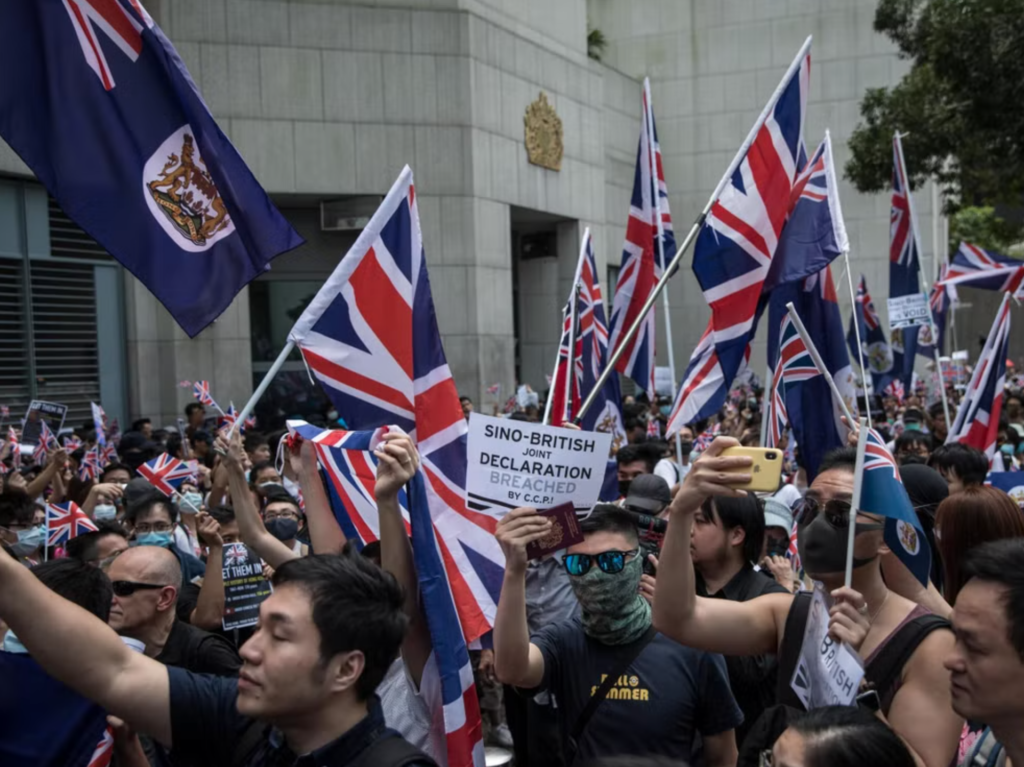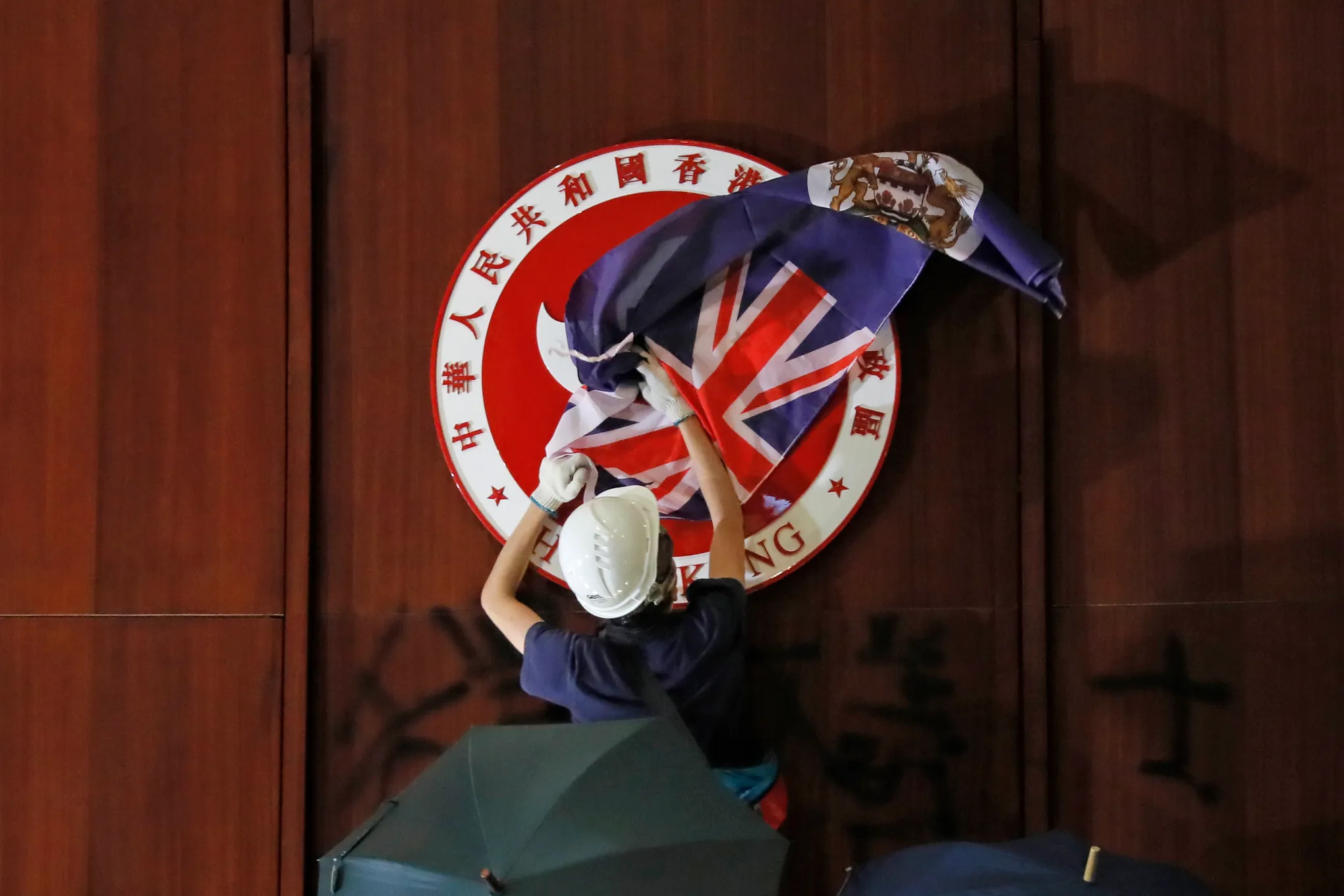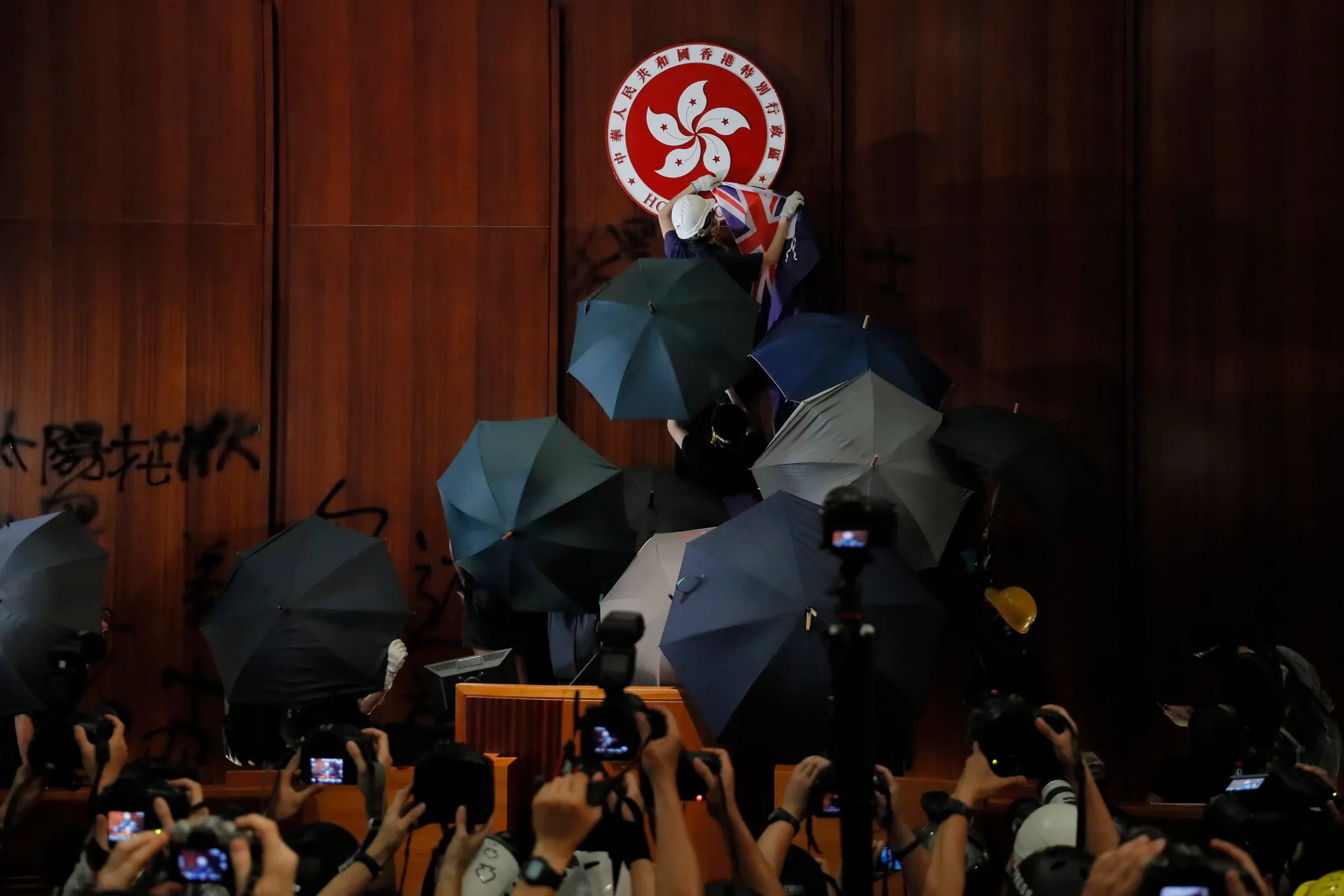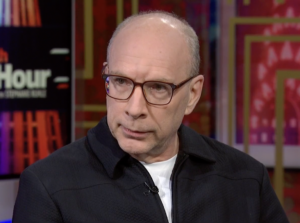The Paradox of Post-Colonialism in Hong Kong
As of now, Hong Kong remains a battleground not only for its own future but for the direction in which the global ideological compass will swing—the enduring Western Hegemony or the New Axis of Autocracy. A fundamental dichotomy emerges, pitting a world anchored in the principles of liberal democracy against the ascendancy of a technologically bolstered authoritarian order. I know which world I want to live in. Do you?

Flowers and a photograph were placed for Queen Elizabeth II outside the British Consulate in Hong Kong. Photo Credit: Anthony Kwan / Associated Press
On September 16, I found myself entranced by a scene that had unfolded outside the British Consulate in Admiralty, the eastern extension of the central business district on the Hong Kong Island. There, hordes of Hong Kong residents patiently formed lengthy lines, dedicating hours of their time to pay homage to the late Queen Elizabeth II. A colossal bed of flowers and reverential portraits of the queen gradually adorned the consulate walls, evoking a profoundly moving tribute. This outpouring of affection for the departed monarch may indeed stand as one of the most extraordinary displays witnessed beyond the borders of the United Kingdom.
I stumbled upon a video of a man playing a tune on his harmonica and discovered that the song was “Glory to Hong Kong,” the unofficial anthem of the protesters during the 2019 pro-democracy protests. The lyrics go: “Stars may fade, as darkness fills the air. Through the mist, a solitary trumpet flares: Now, to arms! For Freedom, we fight, with all might we strike!” A few days later, I found out that the same man was arrested over the suspicion that he might carry out an “act with seditious intent,” as the Hong Kong police told the BBC.
Unfortunately, what happened has become all too predictable now. A former radio DJ found himself behind bars for daring to voice anti-police slogans and rallying cries such as “liberate Hong Kong” and “revolution of our times.” Owners of boba shops were sentenced to six months in prison for expressing their reservations about vaccinations online. Even a 67-year-old woman faced the heavy accusation of sedition and subsequent arrest, all for the seemingly innocuous act of applauding a defendant during a hearing in court.
The plight extends further as journalists are increasingly targeted and apprehended, while independent newspapers like Apple Daily were forcibly shut down for simply writing and publishing pro-democracy op-eds. Anybody presumed to incite hatred against the government could be imprisoned. Police officers have been deployed to walk the streets and spy on local businesses. At this very moment, pro-democracy advocates are sitting in jail cells and solitary confinement.
Things like this have been happening since 2020 when the Chinese Communist Party (CCP) in Mainland China decided to implement a national security law in Hong Kong under the guise of safeguarding against “secession, subversion, collusion with foreign forces and terrorist activities.” In reality, the law serves as a means to suppress the 2019 protest that was instigated by an extradition bill that would allow any alleged suspects to be extradited to the Mainland and be prosecuted there, where the legal system is arbitrary and potentially denies them due process.
The 2019 protest over this bill was not unwarranted, given that billionaires and booksellers have been abducted by CCP personnel and have to stand trial in a kangaroo court. Perhaps, the most notorious case is one about a series of disappearances in 2015 of the owner and staff members of Causeway Bay Books, a former bookstore located in Causeway Bay, Hong Kong. On February 28, 2016, the owner of the bookstore, Lam Wing-kee made an appearance on Phoenix Television along with three other men. In an act of coerced compliance, Lam confessed to a crime he had not committed, specifically the so-called offense of “illegal book trading” and alleged involvement in smuggling banned books to Mainland customers. Upon his return to Hong Kong, Lam held a press conference, detailing his abduction, his unjustifiable eight-month detention in China, and the calculated nature of his scripted and coerced confession. In essence, the extradition bill—had it been enacted—would have effectively made the very kind of kidnapping, experienced by Lam and countless others, legal.

In spite of the official withdrawal of the bill on October 23, 2019, the national security law was passed in its place in 2020. This new law has granted Mainland authorities sweeping powers to conduct surveillance, detain individuals, and carry out searches without restraint. It is a deliberate attempt by the Chinese Communist Party to erode the agreed-upon “One Country, Two Systems” framework, thereby undermining the civil liberties promised to the people of Hong Kong under the Sino-British Joint Declaration. The Declaration should, at the very least, have guaranteed autonomy to Hong Kong for 50 years, until 2047.
Why should we in America care about these developments? The answer is quite straightforward. The CCP is already exerting much influence over our daily lives, shaping the very fabric of what we touch, watch, and experience. We see Hollywood movies that are altered to satisfy Chinese censorship. We observe the presence of Confucius Institutes, camouflaged as language and cultural learning centers, that undercut academic freedom at host universities and advance the Chinese government’s political agendas abroad. We hear about China’s Thousand Talents Plan program that secretly hires foreign experts like Dr. Charles Lieber, Chair of the Department of Chemistry and Chemical Biology at Harvard University, to engage in academic espionage and steal proprietary information. We watch the news about how China is exporting its internet blockade technology, dubbed the Great Firewall to Iran, Cuba, and Zimbabwe. We witness China’s influence when professional wrestler and actor, John Cena, apologizes for calling Taiwan a country, and when basketball player LeBron James abruptly goes quiet on the issue of social justice when it comes to the world’s greatest threat to human freedom.
If we want proof that what happens in Beijing doesn’t stay in Beijing, just think about the unprecedented COVID-19 pandemic that we all just lived through. It was the CCP that deceived everyone about the nature of the pandemic and pressured the World Health Organization to tell the world that there was “no clear evidence of human-to-human transmission” — despite Taiwan’s warning and cases starting to increase that raised suspicion of contagion. In other words, we don’t need to reside in Mainland China to be impacted by the policies and choices of the CCP. If China is willing to violate the Joint Declaration and take away Hong Kong’s freedom in plain view of the international arena, we ought to ask ourselves: what or who will be next?
So, why are we, in America and the West, allowing this to happen to Hong Kong? The answer to this question is a lot more complicated, as the events that transpired in Hong Kong didn’t happen all at once. From the failure of the Umbrella Movement in 2014 to the short-lived victory of the Anti-Extradition Bill Protest in 2019, and the New Year’s Day march in 2020 which ended with mass arrests. Among the various factors at play, today I wish to focus on the post-colonial movement as a significant contributor.
Just a couple of days ago, I saw a tweet by Multipolarista journalist Ben Norton: “These Hong Kong separatist activists are openly calling for China to be colonized. It wasn’t a coincidence that they constantly waved the British colonial flag during the violent Western-backed riots in 2019-2020,” in response to pictures of Hong Kongers paying their tributes to Queen Elizabeth II. This tweet is a prime example of how progressive elites typically treat post-colonial theory as an absolute truth rather than a theoretical framework, which by definition is just a supposition to help us understand things.
What exactly is post-colonialism? Many people tend to think that post-colonialism is synonymous with decolonization, but regardless of their close connection and being viewed as two sides of the same coin, they have some differences. Decolonization, as a theory, involves a collection of ideas focused on undoing the lasting effects of colonialism. As a historical phenomenon, it refers to actively engaging in strategies to dismantle colonial structures and establish independence. On the other hand, post-colonialism merely examines the consequences of colonial rule, exploring how it has molded societies, cultures, and identities. To put it succinctly, British post-colonial theorist and cultural critic Robert J. C. Young, in his 2003 book Postcolonialism: A Very Short Introduction, proposes that post-colonialism offers a political philosophy of activism. This philosophy challenges the current landscape of global inequality in a manner that not only continues the anti-colonial struggles of the past but also empowers us to decolonize our lives in the present.
Nonetheless, the problem with post-colonial analysis lies in its tendency to neatly slot everyone along a spectrum, ranging from “the colonizers” to “the colonized,” primarily based on racial distinctions. This approach oversimplifies power dynamics, reinforcing the notion that oppression can only come from those perceived as white and Western due to their association with the 18th- and 19th-century imperial powers that engaged in colonization. On the flip side, the concept of the oppressed encompasses individuals whose identities have been marginalized—those from the East or Global South, people of color, and the indigenous or native populations of colonized territories who were subjected to colonial rule.
Though the intention behind looking at the world through this lens is commendable for raising awareness of injustice, it often overlooks struggles against repression in contexts where the oppressor and the oppressed share the same race, as seen in the ongoing situation in Hong Kong. Post-colonialism has predominantly centered its focus on geopolitical contexts such as the Middle East (Edward Said), India (Gayatri Chakravorty Spivak and Homi Bhabha), and Africa (Ngũgĩ wa Thiong’o and Frantz Fanon). But its applicability becomes strained when progressive elites try to apply it indiscriminately to all geopolitical contexts, especially those with different histories like Hong Kong and Singapore.
Perhaps this is why progressive media and journalists appeared perplexed when covering Hong Kong protesters who, during the 2019 demonstrations, proudly brandished the British Union Jack. For post-colonial observers, witnessing residents of a former colony raising a colonial flag or expressing grief over the passing of their colonizer’s Queen may seem discordant. What eludes their comprehension is the acknowledgment that, without the British legacy of common law established through colonial rule, there would be nothing to protest about or mourn for. This scenario presents a nuanced contradiction to the post-colonial movement, challenging preconceptions as Hong Kong residents regard Britain not as an oppressor but as a symbol of freedom.

Post-colonialism ignores the very factors that propelled Hong Kong to become a major economic powerhouse in Asia throughout much of the 20th century. It disregards why esteemed economist Milton Friedman deemed Hong Kong a quasi-free-market utopia. The unique blend of capitalism established during British colonial rule, the entrepreneurial vigor of its residents, the official adherence to free-market principles and common-law ideals, and the disciplined commitment to prudent social policies all played an important role in shaping Hong Kong’s success, earning it the title of the “Pearl of the Orient.” Despite being far from a democracy by any conventional measure, Hong Kong under British rule witnessed economic prosperity, political freedom, corruption-free governance, and the freedom of conscience. This contrasted sharply with the experiences of their counterparts in the People’s Republic of China, who were still grappling with the aftermath of Mao Zedong’s destructive Great Leap Forward policies and the Cultural Revolution.
It is imperative to confront the grievous legacies of the British Empire in Africa and the Middle East. Take the British “divide and rule” strategy, for instance, which heightened tribal and ethnic tensions in colonized Africa. This strategy’s impact remains a critical factor contributing to ongoing tensions and sporadic violence today. Similarly, the arbitrary drawing of borders during the colonial era continues to be a root cause of conflicts in the Middle East. However, the assessment of the legacy bequeathed to former colonies like Hong Kong and Singapore may be considerably more intricate than what post-colonial theory can encapsulate. And those, like Ben Norton, who label the 2019 demonstration as a violent Western-backed riot, are essentially useful idiots for the Chinese Communist Party. Their moral calculus is as rudimentary as one can imagine. Have they ever considered that perhaps Hong Kongers just don’t want a future where each citizen is closely monitored by a tyrannical state, assigned a social score, and tracked by tech giants that record their every move?
If there is any validity to post-colonial theory at all, why isn’t China’s current conduct regarded as a form of colonization? From the perspective of many Hong Kongers, the efforts made by the central authority to bring Hong Kong back into one China that most of its population has either never known or who themselves fled after 1949, are unequivocally seen as a contemporary form of colonization. But interestingly, the West only seems to notice the horrible consequences of colonialism primarily when it involves visible distinctions in melanin levels between the colonizers and the colonized. Atrocities that take place within racially homogeneous groups are frequently downplayed or not given the same level of significance. Why is that?
The West is currently entangled in divisive cultural wars over identity, wrestling with guilt for both historical successes and sins. This guilt appears to seek comfort by expressing sympathy for, and even finding allure in, those who oppose democratic principles. The perpetuation of this guilt is driven by the post-colonial narrative, asserting that the West is inherently flawed due to its perceived whiteness and imperialistic past. Meanwhile, extremist groups and foreign autocracies like the CCP are strangely viewed as opponents of imperialism and are therefore applauded as the good guys. This distorted perspective stems from a misguided endeavor to combat a notion of Western “imperialism” that has long dissipated since the aftermath of World War II. It is precisely within this overarching framework that the protestors in Hong Kong during 2019 were unfairly branded as “pro-colonialist protesters,” and the draconian Hong Kong national security law enforced by the CCP was dubiously hailed as “a decolonization process.”
It is readily apparent that post-colonial advocates exhibit a discerning selectivity in their denunciation of colonialism, conveniently overlooking the fact that the course of human civilizations and the geopolitical landscape we currently occupy bear indelible imprints of imperial aggression and expansionist coercion. Colonialism has existed across societies since the dawn of time, rendering itself not as an aberration but rather as a normative phenomenon. Examples range from the Muslim conquest led by Prophet Muhammad, who amassed a huge following and tried to spread his caliphate around the world, to the Mongol Empire that expanded to cover most of Eurasia from 1206 until 1368, thanks to advanced technology and a massive horde of nomadic warriors. Yet, instead of acknowledging this reality and standing in solidarity with the Hong Kongers who face genuine oppression, we find a proclivity to engross ourselves in the fallacious narrative that colonialism is an exclusively Euro-American sin. This penchant for divisive arguments and unfounded accusations tends to undermine their struggle for freedom.
Post-colonial proponents regularly portray cultural products as static and inflexible, tethered to unchanging attributes such as ethnicity and race. In doing so, they ignore the fluid nature of culture, which can undergo evolution through interactions, exchanges, and the impact of historical events like wars, migrations, technological advancements, social movements—and yes, colonialism. Their contention revolves around the assertion that colonial powers imposed their own conceptions of governance, law, and democracy on colonized societies, generally neglecting indigenous systems of governance and self-determination. Their emphasis lies in highlighting how colonialism led to the suppression of indigenous political structures and the imposition of Western models of governance that failed to align with local contexts.
While I vehemently reject the notion of using imperialism to promote democracy, I find it equally absurd when these advocates suggest that residents in Hong Kong, by virtue of being ethnically Chinese, should confine themselves to predetermined cultural spheres and refrain from embracing values characterized as “Eurocentric.” Instead of accepting that colonialism can introduce new ideas, values, and ways of life, resulting in shifts in cultural norms and expressions, post-colonial advocates contend that “decolonization” entails reverting Hong Kong back to the time before the city was ever touched by a colonial power. Essentially, they argue that Hong Kongers aspiring to “Western” values like freedom and democracy must have “internalized” colonialism—an erroneous and patronizing perspective that not only dismisses the agency of the people of Hong Kong but also reduces them to mere marionettes, manipulated by the unseen hands of Western colonists pulling at their strings.
The logical conclusion of post-colonialism is “freedom for me, but not for thee,” grounded in the premise that Hong Kong people, being non-Western, are not entitled to the same ideals. But more than that, it is almost reminiscent of the Chinese Communist Party’s rhetoric which employs similar language to smear pro-democracy activists in Hong Kong as “race traitors” and perpetuate the belief that liberal democracy can never work in China because it is incompatible with “Chinese values” or Confucianism.
This is a display of imprudence. Sure, democracy has its origins in ancient Greece, with Europe contributing to its lexicons and conceptual framework during the Enlightenment. But the mere fact that these ideas were initially formulated in certain regions does not negate the intrinsic desire for democracy, freedom, and human rights that resides within every single one of us. To quote the insightful words of Jimmy Lai, the pro-democracy tycoon who is currently sitting in jail, he astutely remarked, “The inconvenient truth [for the CCP]is that Chinese people in Hong Kong (and in Taiwan) live better than any Chinese in Chinese history.” These regions act as natural laboratories, vividly demonstrating the extraordinary potential for Chinese individuals to thrive within a unique framework that integrates the governance principles of liberal democracy with the cultural tenets of Confucianism.
As Singaporean journalist Melissa Chen eloquently put it, “The seeds of liberty were sown with the sealing of the Magna Carta eight centuries ago and brought to Hong Kong via the Treaty of Nanjing. For 156 years, Hong Kong was a beneficiary, marinating in its legacy.” Even well after Governor Chris Patten sailed away from its shores aboard the Royal Yacht Britannia on June 30, 1997, the resolute spirit of the Hong Kong people persists, unwavering in their steadfast conviction that this legacy is indeed a cause worthy of defending. And rather than being interpreted as a nostalgic longing for their colonial history, the presence of the colonial-era and Union flags and the Hong Konger’s tribute to Queen Elizabeth II should be understood as “a celebration of the values and institutions” that embody the indelible legacy of British heritage. These ideals have evolved and transcended their original context, becoming “path-dependent outcomes” that continue to shape and define Hong Kong.
Of course, intellectuals and the media in the West who flirt with luxury beliefs, such as post-colonialism and decolonization, and rally behind autocrats abroad in an attempt to alleviate guilt over their nations’ historical wrongs, never really have to face the actual risk of a barbaric outcome. Instead, they get to comfortably perch on their self-indulgent moral high ground, championing causes they believe are just. This privilege, however, is elusive for the people of Hong Kong, whose reality is nowhere close to the fantasy of a decolonized or post-colonial society often romanticized by progressives in the West.
As of now, Hong Kong remains a battleground not only for its own future but for the direction in which the global ideological compass will swing—the enduring Western Hegemony or the New Axis of Autocracy. A fundamental dichotomy emerges, pitting a world anchored in the principles of liberal democracy against the ascendancy of a technologically bolstered authoritarian order.
I know which world I want to live in. Do you?





Jay Sophalkalyan is a cultural critic and political analyst whose work explores the fraught intersections of politics, technology, and identity in the modern world. Formerly the Deputy Editor-in-Chief of JPI online magazine, he now writes regularly for Nikkei Asia, The Dispatch, Quillette, and other outlets, with a focus on digital censorship, post-colonial realism, and the creeping authoritarianism of both East and West. Born in Cambodia and raised across continents, Jay brings a transnational lens to his writing—rooted in classical liberal values and honed by a principled skepticism of ideological excess. He earned his master’s degree in Experimental Humanities from NYU in 2024, specializing in journalism and political theory. His Substack, Thought Criminal, is a defiant and measured response to the soft totalitarianism of our age.




